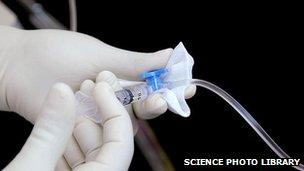UK doctors 'perform euthanasia' - top Dutch medic
- Published

Doctors in the UK are not allowed to help a person to commit suicide
A top Dutch medical professional says some British doctors carry out euthanasia, even though a UK court has again ruled that killing a chronically ill person is illegal.
"The practice is done everywhere. In England they're doing it too," said Arie Nieuwenhuijzen Kruseman, head of the Royal Dutch Medical Association.
Doctors in the UK "tell me that they do it," he said. "Some use IV potassium, high doses of insulin, morphine."
Euthanasia is legal in the Netherlands.
On Thursday the High Court in London ruled that doctors cannot legally end the life of a man paralysed from the neck down who has been fighting for the right to die.
The Tony Nicklinson case has reignited an emotionally charged debate on euthanasia and the right of an individual with severe disabilities or diseases to ask a doctor to end his or her life.
Had the judges backed Mr Nicklinson's plea, it would have allowed doctors to end his suffering without fear of being prosecuted for murder.
'Duty to end suffering'
In the Netherlands euthanasia has been legal for a decade. Some Dutch medical experts say Tony Nicklinson's case is a "textbook example" of why people should be given the right to decide when they die.
According to Dr Kruseman, "if the only possibility is death by euthanasia it's the responsibility you have for your patient when they are experiencing unbearable suffering".
Commenting on the doctor's claim, a spokesperson for the British Medical Association (BMA) said: "We are opposed to the legalisation of assisted dying and we are not lobbying for any change in the law in the UK.
"Assisted dying is illegal in the UK, so doctors are not permitted to carry out euthanasia."
The Royal Dutch Medical Association (KNMG) says that in the absence of an open debate the practice will go on, but in a covert and unregulated manner.
Mobile euthanasia units are the latest addition to the Netherlands' liberal euthanasia provisions. The private medical teams - critics call them "death squads" - were created with the sole purpose of visiting people at home and carrying out euthanasia when a patient's own doctor refuses to administer the injection or lethal dose of drugs.
The units are funded through voluntary donations via the Dutch Right to Die organisation (NVVE).
NVVE chief executive Petra de Jong says others could learn from the candid approach towards death characteristic of the Netherlands.
"I think the British need to discuss the subject. Throughout our lives we are in a society now where we can choose everything and it's ridiculous to exclude the end of your life in those choices. You can enjoy life more if you know you can die in the way you want to die."
According to the NVVE, 95% of people in the Netherlands now support the legal status of euthanasia.
Qualified right to die
In May 2002, Belgium became the second country to decriminalise euthanasia, one month after the Netherlands.
Under Swiss law, assisted suicide without the involvement of a doctor has been decriminalised. But euthanasia - when a doctor gives a patient a lethal injection on the patient's request - is not legal there.
Germany's highest civil court recently delivered a landmark ruling that terminally ill patients on life support should have the right to die if they want to.
Under Dutch law euthanasia is permitted if a patient is experiencing unbearable suffering with no prospects of recovery and repeatedly requests that doctors end their life.
The new mobile units operate within the existing legislation, but some critics think they push the limits of the law too far.
Aart Haverkamp lost his wife Anneke to cancer in March. The couple chose to use drugs to numb the pain, allowing Anneke to die without medical assistance.
Aart fears the Netherlands is heading in a dangerous direction that could ultimately mean that people who are "just tired of life" are given help to end it.
"Sometimes if people are sad or lonely, they might think there is no hope. But helping them to commit suicide is not the answer. We should be taking care to make them feel better about life, not just helping them to die. I worry that we make death look easy, but it never is," he said.
- Published16 August 2012
- Published19 July 2012
- Published4 March 2012